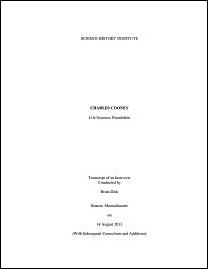Oral history interview with Joseph M. DeSimone
- 2013-May-01 – 2013-May-02
Joseph DeSimone began his childhood in Norristown, Pennsylvania, one of three children. His father, an Italian immigrant, was a tailor; his mother was an accountant; there was a large Italian extended family. DeSimone attended St. Teresa of Avila Elementary School; when not in school he and friends were outside playing. Education was important in the family. The children attended the Catholic school until about junior high school, when the family moved to Collegeville, Pennsylvania. DeSimone was in gifted classes. High school brought discovery of programming and interest in solar architecture. He had typical science classes and labs, but in summer he was selected for a Lebanon Valley College project. He also attended Ursinus College for math classes, resulting in a scholarship to Ursinus.
At Ursinus, DeSimone felt academically challenged for the first time. He conceived a love for polymers and was recruited by Virginia Polytechnic Institute (Virginia Tech) for graduate school. After his PhD he intended to return to Philadelphia, but University of North Carolina persuaded him to join their faculty. There he began work with supercritical fluids. He published many papers, obtained grants from the National Science Foundation (NSF) and the Office of Naval Research, and was granted tenure early. He became the first Kenan Professor of Chemical Engineering at North Carolina State University, eventually establishing an NSF Science and Technology Center. His next interest was supercritical CO2, with which he replaced water to manufacture surfactants. He won a Presidential Green Chemistry Award; founded dry cleaning soap company, Micell Technologies; and developed dry cleaning equipment. DeSimone found further use for supercritical CO2, producing bioabsorbable stents with Richard Stack, and founding another company, whose stents are in clinical trials around the world. He met Stephen Quake and changed the direction of the STC from CO2 to more microfluidics, inventing “liquid Teflon,” then molds. He and his students invented PRINT (Particle Replication in Non-Wetting Templates), which allowed them to make uniform colloidal particles for the delivery of nucleic acids and medicines, and founded, Liquidia Technologies.
DeSimone established the Institute for Advanced Materials, Nanoscience, and Technology, increasing knowledge in medicine and energy. Because of PRINT’s nanotechnology DeSimone was asked to establish the Carolina Center for Cancer Nanotechnology Excellence, using funding from the National Cancer Institute. He is affiliated with Memorial Sloan-Kettering Cancer Center. He has been elected to National Academy of Sciences and the National Academy of Engineering. He is now the Director of the Kenan Institute of Private Enterprise at UNC.
DeSimone concludes his interview with some general thoughts. He says his wife and son are his present mentors; he credits earlier mentoring and friendship from Chad Mirkin, Robert Langer, and Edward Samulski. He says he is currently working on grants and renewals.
Access this interview
By request 1 PDF Transcript File and 2 Audio Recording Files
Fill out a brief form to receive immediate access to these files.
If you have any questions about transcripts, recordings, or usage permissions, contact the Center for Oral History at oralhistory@sciencehistory.org.









